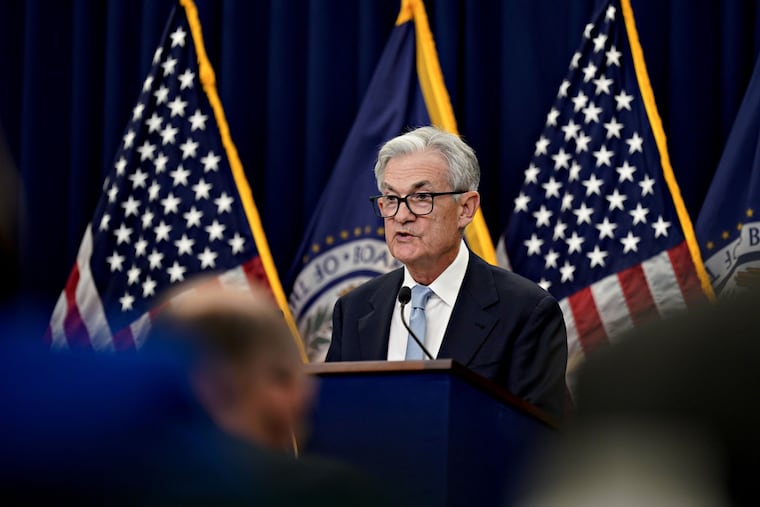Credit unions and community banks worry Fed moves will squeeze their customers
As the Fed announced the ninth-straight interest rate hike, neighborhood banks feel pressure to keep customers.

Following the recent bank collapses, the Federal Reserve on Wednesday boosted interest rates another 0.25% and softened the language it uses to describe future rate hikes.
Wall Street is pushing hard for an end to rate hikes and for regulators to ease pressure on large, troubled banks. What does this mean to community lenders and credit unions focused on neighborhoods?
The Inquirer asked Gary Golden, boss at 10,000-member, $227 million-asset BHCU credit union in Ridley Park, and Charles Crawford, chief executive and chairman of Northern Liberties-based, $360 million-asset Hyperion Bank, about the impact of higher rates to date, and whether borrowers and depositors should worry more banks will fail.
Some highlights:
Wednesday’s Fed increase was small and reassuring
Fed governors “felt like they needed to signal that the inflation fight is ongoing” and the stress on the banking system is mostly “isolated” to a few banks, unlike in 2008, when the drop in real estate prices stressed much of the banking system, said Hyperion’s Crawford.
But the uncertain economy, he added, has left “so many puzzle pieces outstanding,” that the Fed is leaving itself a wide range for rate hikes (and even eventual cuts) later this year.
With a banking crisis “already started” and the economy enduring “rolling recessions by sector,” the Fed will likely boost rates a bit more, then start cutting, stabilizing long-term interest around 4%, the credit union’s Golden predicts.
There’s a danger the banking economic crisis will further stress local lenders and their customers, Golden added. “The small guy gets it from both sides” with the Fed raising rates, Treasury rushing to protect big banks and make them extra attractive to depositors, and smaller lenders feeling outgunned.
Are businesses scared to grow?
The current economic turmoil isn’t a surprise to longtime lenders like Golden and Crawford.
“The Fed always takes interest rates up too fast, and then — poof! — down to the bottom,” said Golden. Add the expense (to other lenders) of government-mandated bailouts and flooding more money into the economy when needed, and things can get worse before they get better, he added.
“Still, I view this crisis as an opportunity,” Golden said, noting that BHCU is planning to expand beyond Delaware County. “We serve some long-standing customers, and we will pick up new ones, some whose banks have merged, who want a relationship with a banker they can visit. In crisis times you look for safety.” He noted his credit union buys extra insurance on deposits up to $500,000, double the FDIC limit.
“This area is full of entrepreneurs — mom-and-pop shops, people who start a store, a bar, a restaurant, a pet day-care. Sometimes it’s guys who work at the helicopter plant, right here in Ridley,” Golden said. “They become real estate investors. They’ll buy townhouses in the boroughs and fix them up.”
But under today’s conditions, BHCU is less likely to fund start-up businesses. “We are more likely to push them toward Small Business Administration [government-guaranteed] loans,” he said.
At Hyperion, lenders have gotten “tighter” with loan requirements, Crawford said. And yet “lending hasn’t slowed down. We were budgeted to grow to $4 million a month this year. But we’ve added $30 million so far. ... For every job that we go over and it doesn’t pencil out, others take their place.”
He said he’s seeing an ongoing increase in construction of apartments in West Philadelphia, Center City, and in North Philadelphia. All those real estate developers are looking for loans.
How long can this go on? “I gotta believe it will slow down some,” the longer rates rise, Crawford said. “The rise in rates helps our spread,” the profitable gap between the cost of bank funding and the income from lending. “But it also brings more bad loans.”
Harder to lend?
“We have to watch for loan losses,” said the credit union’s Golden. “We are mostly a real estate lender. Loans to business are 40% to 45% of what we do [the rest are home and personal loans]. We have never had a single commercial loan lost.” As a customer-owned credit union, which pays member dividends instead of piling up profits, he wouldn’t relish having to confess loan losses.
“But now, for business loans, it’s definitely slower,” Golden added. “We have to be a little more picky.”
And, on the funding side, as deposit rates rise slower than loans, “banks are having to fight for deposits. We are seeing people go to chase higher yields. Not long ago, everyone was paying 1% at most. But now they’re seeing ads, a CD for 5%. So large blocks of money can suddenly leave,” Golden said.
He said Silicon Valley Bank’s collapse had created stress, causing people to worry about their deposits.
“They hit the panic button,” he said. “So we remind our members they are insured to $250,000 per account. We have additional insurance for up to $500,000, the only credit union in our area that I know of that does that.”
Meanwhile, banks can’t lend money they don’t have. “With inflation, people are definitely not saving as much. They are spending from their accounts to live, so that is less money on deposit, and we have a little less to lend,” Golden said.
Compared to the late 2000′s crisis, Hyperion’s Crawford concluded, “the banks this time are well-capitalized. I don’t think we’ll get another crisis like we had in 2008-09. But they didn’t expect it then, either.”